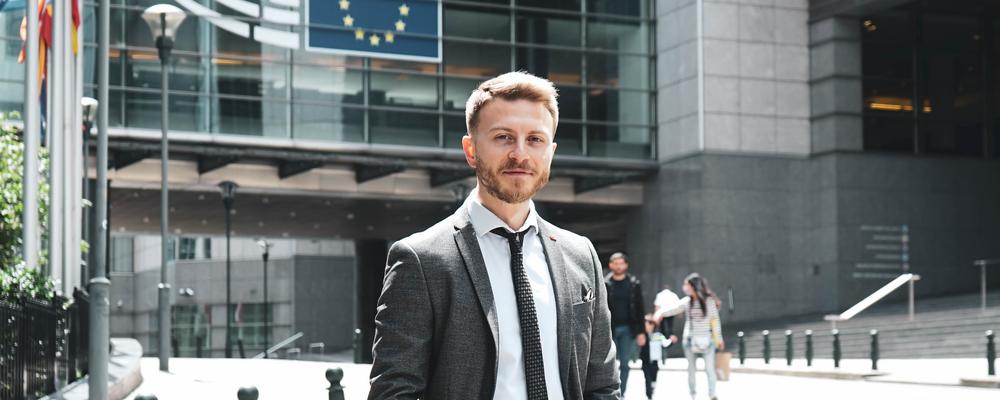
Gökay's programme led him to the political games in Brussels and now his eyes are set on the automotive industry
In 2016, Gökay Çınar left home in Turkey to complete his bachelor’s degree in Budapest – a journey that would later take him to Germany and eventually Sweden. He is now in his final year of the Master’s Program in European Studies, Social Science Track. Looking back on his journey, he is happy with his decision to study in Sweden and hopes to inspire others to do the same.
Why did you choose to study in Sweden?
There was actually a funny story behind it. In my first week in Budapest, I and my friends decided to go to IKEA to buy some things for our accommodation. We had a lunchbreak and I ordered meatballs which came with a Swedish flag stuck out of them. I loved it and decided to keep the flag. The whole thing just stuck in my mind after that. When I thought about applying for a master’s program in Scandinavia, I mostly applied to Swedish universities and I think that IKEA trip was the reason behind it. Of course, I also grew up hearing about the gender equality, freedom, and hospitality here, so the IKEA trip was a boost for me rather than something that just happened in a second.
What makes Sweden different from the places you have been?
Firstly, it was a big relief that people in Sweden speak English fluently as if it was their native language. Secondly, I love that people are so nice. I am not saying that people are not in Germany or Hungary, but I get the feeling that people here are more relaxed but disciplined at the same time, which somehow work smoothly together. I am a disciplined person myself and I find it comfortable to live in Sweden. Thirdly, the education system is completely different from what I have experienced. There is no memorizing system where you try to cram things for an exam and later forget about them. In Sweden, there is no pressure on students but at the same time you learn things by studying in groups, writing essays, and reading a lot by yourself. I am really happy with my decision to study at the University of Gothenburg.
What is your favorite aspect about your program?
I would say the organization. Take my current course in European Environment and Energy for example. The course is divided into smaller themes like energy, the environment, environmental economics, etc. and for each theme we have different professors with expertise in that field coming to give lectures. The themes are well connected, and I get to learn from different aspects and perspectives. The assignments are also purposefully designed to prepare us for our final project – the master’s thesis – which I find really beneficial.
You did your traineeship in an EU institution. Could you talk more about this experience?
Yes, I found my traineeship at the European Committee of the Regions (CoR) – an advisory body of the European Union located in Brussels. It represents the regions and cities of the EU’s member states. What the CoR does is to give advice on EU legislations or directives from the regions’ perspective, because whatever the European Commission or the European Parliament do will have an impact on the regions.
Did you have any expectations when starting this traineeship?
Of course. I wanted to see how the EU really works from the inside. I know what it looks like from the outside or on papers from my university education, but not how the politics is done. Now I have seen it after joining party talks and following their discussions. It was the first time I saw politics being done in real life and it was quite interesting.
I also realized that politics was not as I expected. If you have watched the series ‘House of Cards’, you could see that politics is super interesting and scary at the same time. It is a kind of game that people play: they keep secrets, they want to get information from others and influence each other. Of course, I am comparing two different things, one is an EU’s body and another the (fictional) US government, but I would say there are some similarities.
What are your plans for the future?
Because of my traineeship, I learned a lot of things about myself and what I want or do not want to do. I realized that I prefer to be more involved in the field rather than doing research all the time. I was given a research task on the automotive industry during my traineeship, but the idea of only doing desk research did not really excite me.
I then came up with an initiative to interview some people from Volvo for their opinions, which received support from my supervisor. After some successful interviews with representatives from Volvo’s EU office in Brussels, I invited them to a group meeting at the CoR where they gave a speech on Volvo’s stance towards the New Green Deal and the transformation of the automotive industry.
During this process, I realized that I am interested in the automotive industry, which is why I am writing my master’s thesis on aspects of this industry such as batteries, recycling and sustainability. After graduation, I want to work in this field or in business development.
Last question: Being Turkish, what is your take on Sweden’s beloved kebab pizza?
To be honest, I have not eaten kebab pizza. My friends have been telling me that it is the best food here, so I think it is time I gave it a try. While I cannot make any judgment on it now, I can say that kebab is no longer just Turkish food; it has become something European. At least kebab is in the EU now, Turkey is not, as you know.
Written by Hannie, Student Content Team